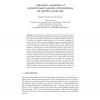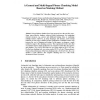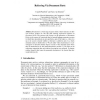101
click to vote
CICLING
2006
Springer
15 years 4 months ago
2006
Springer
Abstract. This paper argues that wordnets, being concept-based computational lexica, should include information on event and argument structures. This general approach is relevant ...
110
click to vote
CICLING
2006
Springer
15 years 5 months ago
2006
Springer
Abstract. We propose to use semi-supervised learning methods to classify evaluative expressions, that is, tuples of subjects, their attributes, and evaluative words, that indicate ...
131
click to vote
CICLING
2006
Springer
15 years 5 months ago
2006
Springer
Abstract. In this paper, we describe a new unsupervised sentence boundary detection system and present a comparative study evaluating its performance against different systems foun...
132
click to vote
CICLING
2006
Springer
15 years 5 months ago
2006
Springer
We show that excluding outliers from the training data significantly improves kNN classifier, which in this case performs about 10% better than the best know method--Centroid-based...
139
click to vote
CICLING
2006
Springer
15 years 5 months ago
2006
Springer
Abstract. In this paper, we present a method for the automatic acquisition of semantic-based reformulations from natural language questions. Our goal is to find useful and generic ...
130
click to vote
CICLING
2006
Springer
15 years 5 months ago
2006
Springer
Several phrase chunkers have been proposed over the past few years. Some state-of-the-art chunkers achieved better performance via integrating external resources, e.g., parsers and...
111
click to vote
CICLING
2006
Springer
15 years 5 months ago
2006
Springer
Previous work by Pedersen, Purandare and Kulkarni (2005) has resulted in an unsupervised method of name discrimination that represents the context in which an ambiguous name occurs...
122
click to vote
CICLING
2006
Springer
15 years 5 months ago
2006
Springer
Documents in a wide range of genres often contain references to their own sections, pictures etc. We call such referring expressions instances of Document Deixis. The present work ...
123
click to vote
CICLING
2006
Springer
15 years 5 months ago
2006
Springer
We present a statistical generative model for unsupervised learning of verb argument structures. The model was used to automatically induce the argument structures for the 1,500 mo...



